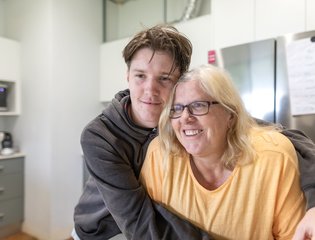Busting the myths about BRCA

Busting the myths about BRCA
Navigating the world of genetic testing can be very confusing and scary at times. That's why we're addressing some of the common myths surrounding testing for BRCA gene faults (also known as mutations or alterations).
Myth 1: If I have a BRCA gene fault, I will definitely get cancer!
Truth: Finding out you have a BRCA gene fault is a life-changing thing, but it is not a death sentence! Your lifetime risks vary depending on the particular gene fault you carry, your family history, and whether you are male or female. Your genetic counsellor will go over these with you and explain the age that the risks start to go up. Take a look at the average risks as these risks are for your whole lifetime.
Finding out you have a BRCA gene fault can mean you have different options for treatment if you do have cancer (click here for more information). It also means you can take action early to reduce your risk of getting some of the cancers linked to the gene faults. For details of preventative options click here.
Myth 2: Testing negative for a gene fault like BRCA1 or BRCA2 means I will not get cancer.
Truth: Testing negative for BRCA1 or BRCA2 can mean a number of things. If you have a known gene fault in your family, and you test negative for that fault, this means you haven’t inherited the higher risk linked to that fault. You will still have at least the same risk of getting cancer as the general population, which for ovarian cancer is around 2% lifetime risk. It is worth knowing what symptoms to look out for.
If you have a strong family history of cancer but no gene fault has been identified, it could mean there is a gene fault in your family that has yet to be found by researchers. Your genetic counsellor will discuss with you what this means for you and your family and what your risks may be.
Myth 3: BRCA mutations can “skip” a generation.
Truth: Genetic mutations can’t “skip” a generation. Not everyone with a gene fault gets cancer, so it can be that across several generations, nobody gets cancer at all, but the gene fault was still passed down to you or your children. Similarly, if you test negative for a particular known fault, it cannot “skip” you, and you cannot pass it down to your children.
Myth 4: BRCA gene faults are only passed down the female line
Truth: BRCA gene faults can be inherited by, and passed down to, men or women. If someone has a BRCA gene fault, there is a 50/50 chance they pass it onto each child they have, whether they have a son or a daughter. This is why it’s important to look at both sides of the family when researching your family history.
Myth 5: BRCA gene faults only affect women
Truth: Not only do BRCA mutations impact men due to the fact that all men have a mother, sister, friend or partner in their life who could be at risk, but their own cancer risk is increased if they have a BRCA gene fault. Did you know men can get breast cancer too? BRCA gene faults impact prostate and pancreatic cancer risks so men should be aware of how they could be impacted.
Find out more about BRCA and men.

If I have no breast cancer in my family, do I need to worry about having these genetic mutations?
Myth 6: If I have no breast cancer in my family, I don’t need to worry about having these gene faults.
Truth: BRCA1 and BRCA2 aren’t the only gene faults that can increase your ovarian cancer risk. Lynch Syndrome, for example, is a group of gene faults that cause a number of cancers. In this case, you may not see breast cancer in your family history, but may see other cancers such as bowel, endometrial (womb), ovarian, or stomach cancer.
For more information about different gene faults that impact your ovarian cancer risk, take a look at our page on ovarian cancer risks and causes.
Myth 7: I have ovarian cancer but no one else in my family has had cancer, so there’s no point getting BRCA tested.
Truth: Although only around 20% of ovarian cancer cases are caused by a gene fault like BRCA, up to 50% of women diagnosed with ovarian cancer who test positive for a BRCA fault actually have no family history of the disease. Based on current guidelines, if you have a high-grade serous epithelial ovarian cancer you are automatically eligible for BRCA1/2 genetic testing.
This testing can help inform your treatment or even mean you are eligible for clinical trials, so your oncology team should talk to you about the process. Finding out you have a genetic mutation could also give other members of your family, or your children, the option to take preventative action to reduce their own risk.
For more information about getting tested when you have ovarian cancer, please see here.
Myth 8: Everyone else in my family has been tested, so I have to be too.
Truth: It is entirely your decision whether you want to have a genetic test or not. No one can make that decision for you. It is worth speaking with a genetic counsellor to discuss all your options and what impact the genetic test would have but the final decision is yours. If you decide you do not want to testing right now, you can always go back to your genetic counsellor in the future
For more information about BRCA, please check out the BRCA Hub or contact info@ovarian.org.uk


